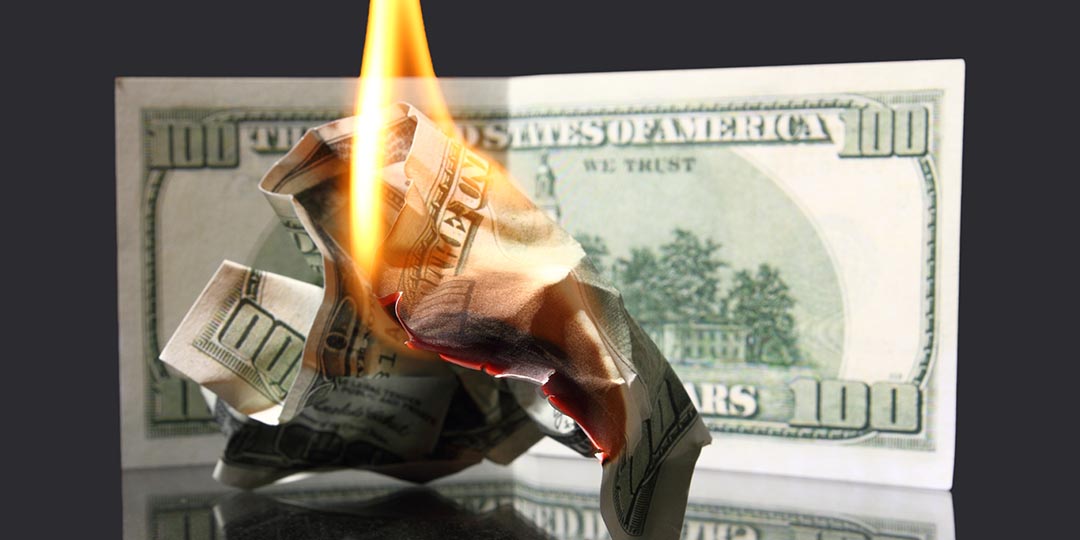If you want to settle your federal student loans, I have a suggestion for you – don’t do it. It’s time-consuming, exposes you to an enormous amount of risk, often results in savings that are outweighed by the damage to your credit, and does nothing to advance your long-term financial goals. In case you weren’t listening, let me repeat it: settling a federal student loan is usually a stupid move.
And yet.
I know you want to discuss settlement. You think it’s going to be one of those “pennies on the dollar” situations, or that the Department of Education doesn’t have your promissory note so you can use it to get a sweetheart deal. Your brother’s uncle’s nephew did it and got them to settle a $95,000,000 loan for $4.18. The federal student loan system is predatory.
Most of what you believe about settling your balance with the U.S. Department of Education is false. Not only are you not going to make a deal that results in an enormous discount, but it’s also probably not a prudent financial move.
So before you tell me about how you want to make a deal to pay off your federal student loan, please read this. In fact, take the time to read this article four times.
You can settle federal student loans
The federal regulations allow debt collectors to settle your federal student loans through a process called compromise.
Compromises are account settlements that involve the debt collector working on behalf of the U.S. Department of Education accepts a reduced overall payment to satisfy your federal student loan in full. Debt collectors are specifically instructed to discuss compromise settlements only after negotiation of the borrower’s ability to pay has progressed and under other circumstances allowed by permitted by the government.
In other words, a debt collector can’t offer a settlement unless they’ve exhausted every possible opportunity to get you to pay your federal student loan.
You can’t settle a federal student loan in good standing
The government doesn’t settle federal student loans unless they are in default. Loans in good standing, forbearance, deferment, or even delinquency aren’t eligible for settlements. This makes sense – settling any debt is a good deal for the creditor only if there’s a reasonable expectation that there’s no way the loan is going to get paid voluntarily.
A federal student loan goes into default once it is 270 days past due. You’ve got to miss a minimum of 9 monthly payments, incur the late fees and interest that accrue during that time, and be willing to deal with collection calls and letters from your student loan servicer as your loan goes from delinquency to default.
You’ll also crash your credit score during this period of delinquency, as the servicer reports your loan as past due – first 30 days late, then 60, then 90 … up to default at 270 days. Other creditors may close your account as your credit score spirals to new lows, so don’t expect to get a mortgage or a car loan for quite some time.
3 ways to settle a defaulted federal student loan for less
A federal student loan settlement allows you to pay less than the total balance. The real question, however, is how good of a deal you can reasonably expect. For that, we need to take a look at the three types of federal student loan compromises available.
To make it easier, let’s pretend you took out the maximum allowable federal student loans for your undergraduate education – $57,500. At an interest rate of 6.8% that’s been going for over four years, we add outstanding interest totaling $18,572. You also have late fees of $119. When you go into default, an additional projected collection fee of $18,515 gets tacked on top for a total of $94,706.
Option 1: Standard Compromise
Standard compromises involve your agreement to pay your defaulted federal student loan in one of the following three ways:
- the current principal and half the interest (with a waiver of all projected collection costs and fees); OR
- the current principal and half the interest (50%); OR
- at least 90% of the current principal and interest balance.
Once approved, you are required to pay the compromise amount in full by certified funds (cashier’s check, money order, certified personal check) or by credit card within 90-days from the date of the approved compromise. Extensions need to be preapproved by the Department of Education and are rare.
Given the numbers above, your best outcome under a standard compromise would require you to pay $66,786. However, that’s not the complete story.
In general, the amount of canceled debt is taxable; you must report the canceled debt as income on your tax return for the year the cancellation occurs. Unless you qualify for an exception, you will end up paying more money to the IRS and state tax authorities.
Option 2: Discretionary Compromise
Discretionary compromises begin with you, the borrower, offering less than the standard compromise amount. The debt collector can accept a discretionary compromise only after receiving prior approval by the Department of Education.
To submit your discretionary compromise offer, the debt collector will require you to provide a letter justifying the discretionary compromise offer. If the basis of the discretionary compromise is a financial hardship, you will also need to supply:
- A financial statement showing the values of all assets and liabilities;
- Current pay stubs equal to one month’s salary, or verification of unemployment;
- Copy of your most current tax return and copies of W-2s;
- If you’re married, your spouse’s current pay stubs equal to one month’s salary, or verification of unemployment and most current tax return and W-2s; and
- Supporting documentation proving any expenses the debt collector considers necessary.
Once you send in your required documents, the debt collector is required to evaluate the offer and forward it to the Department of Education along with a copy of your credit report.
Once approved, you’ll pay the compromise amount in full by certified funds (cashier’s check, money order, certified personal check) or by credit card within 90-days from the date of the approved compromise. You’re still subject to possible taxability of the amount canceled, subject to the same exceptions.
There’s a chance that you could end up with a significant balance reduction by using a discretionary compromise, but you’re going to need to prove to your offer exceeds the amount the debt collector would otherwise be able to get by employing standard means of enforcement such as administrative wage garnishment and tax refund offsets.
Option 3: Nonstandard Compromise
The debt collector can offer a nonstandard compromise, but only on a minimal basis. In fact, I don’t see them offered very often. Nonstandard Compromises are compromises offered by the debt collector without the approval of the Department of Education. These compromises allow the borrower to settle their federal student debt below the amount needed for a standard compromise. Depending on the terms of the collector’s contract with the Department of Education, it can offer no more than 3 or 6 of these types of settlements in any single quarter without jeopardizing its deal with the government.
The nonstandard compromise also forces the debt collector to pay the Department of Education the difference between the nonstandard compromise settlement and the standard compromise settlement.
For this reason, it’s rare to see a nonstandard compromise. For the most part, a collector will offer one only if the discount is small relative to the amount of work it takes to obtain payment through other means.
As with the other types of settlements, you’ll be required to pay in full by certified funds (cashier’s check, money order, certified personal check) or by credit card within 90-days. You’re still subject to possible taxability of the amount canceled, subject to the same exceptions.
There’s a chance that you could end up with a significant balance reduction by using a discretionary compromise, but you’re going to need to prove to your offer exceeds the amount the debt collector would otherwise be able to get by employing standard means of enforcement such as administrative wage garnishment and tax refund offsets.
Some federal student loans get written off entirely
Most people who go into default on a debt realize there is a limited time during which the creditor can take to enforce the claim. This statute of limitations prevents people from being hounded for past due debts for the rest of their lives. Unfortunately, there is no statute of limitations when it comes to federal student loans.
That’s not to say, however, that the government will chase you for your defaulted federal student loan for the rest of your life. In fact, the government has the ability to write off your educational debt and suspend collection efforts either temporarily or permanently. 31 CFR 903.1 says that “agencies may suspend or terminate collection” with respect to federal student loans with a balance of up to $100,000, though the U.S. Attorney General has the power to suspend collection on debts over $100,000.
The decision to write off the loan is made on a case-by-case basis, and often the result of the borrower’s financial prospects. Writing off the debt differs from a compromise but can be helpful for some people.
Don’t avoid paying student loans to improve settlement options
Some people read about settling federal student loans and embark upon a course of action known as strategic default, which involves going into default to get a creditor to settle. Though this may be useful for other types of debts, that’s not the case when it comes to federal student loans. In fact, strategically defaulting on your federal loans could reduce your chances of getting a compromise.
The debt collector can compromise your federal student loan only after the Department of Education verifies your inability to pay and its own inability to collect through other enforcement mechanisms. In determining your ability to pay, the government will look to your present and potential future income, inheritance prospects, and the availability of assets or income that could be used to satisfy the debt.
The government will also investigate whether you concealed or improperly transferred assets or money. If you’ve been putting aside cash in the hopes that you can use it to pay for a compromise, the collector is likely to consider those funds as available to pay the debt.
In the end, you’ll have a wrecked credit report, massive additional interest charges and collection fees, and an empty bank account.
Why I seldom recommend that clients settle federal student loans
Let’s go back to the original loan scenario and pretend you have a total outstanding balance of $94,706 in federal student debt. Assuming you can get your hands on the money, you might be able to settle the loan for $66,786.
That creates the following problems:
- You may have to pay taxes on $27,920 – the amount of the debt that was canceled.
- You lose the ability to invest $66,786, which limits your opportunity to generate a positive rate of return.
- If you have a financial emergency after you pay the compromise, you’re less likely to have the money to provide for yourself and your loved ones.
In other words, settling a federal student loan will often put you into a worse financial situation.
Rather than settling the federal student loan, you might be able to consolidate your way out of default or rehabilitate the loan back to good standing. Resolving the default will not only improve your credit score but will remove the possibility of enforced collections.
From there, you can look into one of the many Income-Driven Repayment (IDR) plans available for federal student loans. These IDR plans allow you to adjust your monthly payment based on taxable income and family size. If your income is low enough, you could end up paying as little as $0 per month and set yourself on a long-term path to student loan forgiveness. There are also a variety of forgiveness programs available based on income, disability, and other situations that may be a better financial choice.
Even if you don’t have a low income and enter into a standard repayment plan for your unpaid balance, the payment on $94,706 worth of student debt at 6.8% interest would be about $620 per month for 360 months. Spreading the payments over time allows you to remain in control over your money, letting it work for you even as you pay the loans off.
Should you hire a lawyer to settle your federal student loan?
If you’re thinking of settling your federal student loans, it’s a good idea to talk with a licensed professional who can see all the angles. Get a lawyer, a financial planner, an accountant – but make sure you’re dealing with someone who has a license and a real understanding of the situation.
Run all the numbers, consider whether you’re eligible to have your loans forgiven, and be sure to make the wisest financial choice. Don’t let your emotions determine your actions – it’s usually not something that leads to a good outcome.
Above all, move deliberately rather than quickly. There’s a lot of money on the line, and you can’t afford to make a costly mistake.
ABOUT THE AUTHOR
Meet Jay
 Since I became a lawyer in 1995, I’ve represented people with problems involving student loans, consumer debts, mortgage foreclosures, collection abuse, and credit reports. Instead of gatekeeping my knowledge, I make as much of it available at no cost as possible on this site and my other social channels. I wrote every word on this site.
Since I became a lawyer in 1995, I’ve represented people with problems involving student loans, consumer debts, mortgage foreclosures, collection abuse, and credit reports. Instead of gatekeeping my knowledge, I make as much of it available at no cost as possible on this site and my other social channels. I wrote every word on this site.
I’ve helped thousands of federal and private student loan borrowers lower their payments, negotiate settlements, get out of default and qualify for loan forgiveness programs. My practice includes defending student loan lawsuits filed by companies such as Navient and National Collegiate Student Loan Trust. In addition, I’ve represented thousands of individuals and families in Chapter 7 and Chapter 13 bankruptcy cases. I currently focus my law practice solely on student loan issues.
I played a central role in developing the Student Loan Law Workshop, where I helped to train over 350 lawyers on how to help people with student loan problems. I’ve spoken at events held by the National Association of Consumer Bankruptcy Attorneys, National Association of Consumer Advocates, and bar associations around the country. National news outlets regularly look to me for my insights on student loans and consumer debt issues.
I’m licensed to practice law in New York and California and advise federal student loan borrowers nationwide.
continue reading





